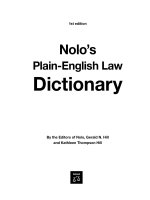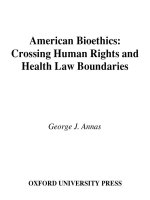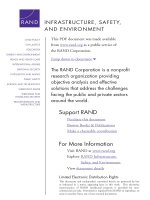Nolo’s Plain-English Law Dictionary pot
Bạn đang xem bản rút gọn của tài liệu. Xem và tải ngay bản đầy đủ của tài liệu tại đây (14.35 MB, 505 trang )
1st edition
Nolo’s
Plain-English Law
Dictionary
By the Editors of Nolo, Gerald N. Hill
and Kathleen Thompson Hill
Keep Up to Date!
Old law is often bad law.
at’s why Nolo.com has
free updates for this and
every Nolo book. And if
you want to be notifi ed
when a revised edition
of any Nolo title comes
out, sign up for this free
service at nolo.com/
legalupdater.
Nolo’s Aim:
to make the law…
easy-to-
understand
aff ordable
hassle free
Books & Software
Nolo publishes hundreds of great books and software programs
on the topics consumers and business owners want to know
about. And every one of them is available in print or as a
download at Nolo.com.
Plain-English Legal Dictionary
Free at Nolo.com. Stumped by jargon? Look it up in
America’s most up-to-date source for defi nitions of cutting
edge legal terminology. Emphatically not your grandmother’s
law dictionary!
Legal Encyclopedia
Free at Nolo.com. Here are more than 1,200 free articles
and answers to frequently asked questions about everyday
consumer legal issues including wills, bankruptcy, small business
formation, divorce, patents, employment and much more. As
e Washington Post says, “Nobody does a better job than Nolo.”
Online Legal Forms
Make a will or living trust, form an LLC or corporation or
obtain a trademark or provisional patent at Nolo.com,
all for a remarkably aff ordable price. In addition, our site
provides hundreds of high-quality, low-cost downloadable
legal forms including bills of sale, promissory notes,
nondisclosure agreements and many more.
Lawyer Directory
Find an attorney at Nolo.com. Nolo’s unique lawyer directory
provides in-depth profi les of lawyers all over America. From
fees and experience to legal philosophy, education and special
expertise, you’ll fi nd all the information you need to pick a lawyer
who’s a good fi t.
Products & Services
“In Nolo you can trust.” —THE NEW YORK TIMES
“Nolo is always
there in a jam.”
—NEWSWEEK
1st edition
Nolo’s
Plain-English Law
Dictionary
By the Editors of Nolo, Gerald N. Hill
and Kathleen Thompson Hill
FIRST EDITION MAY 2009
Editor SHAE IRVING
Cover Design SUSAN PUTNEY
Book Design TERRI HEARSH
Proofreading ROBERT WELLS
Printing DELTA PRINTING SOLUTIONS, INC.
Nolo’s plain-English law dictionary / by the editors of Nolo and Gerald and Kathleen Hill.
1st ed.
p. cm.
ISBN-13: 978-1-4133-1037-5 (pbk.)
ISBN-10: 1-4133-1037-0 (pbk.)
1. Law United States Dictionaries. I. Hill, Gerald N. II. Hill, Kathleen, 1941- III. Nolo
(Firm) IV. Title: Plain-English law dictionary.
KF156.N654 2009
349.7303 dc22
2009011279
Copyright © 2009 by Nolo. All rights reserved. e NOLO trademark is registered in
the U.S. Patent and Trademark Office. Printed in the U.S.A.
No part of this publication may be reproduced, stored in a retrieval system, or transmitted
in any form or by any means, electronic, mechanical, photocopying, recording, or otherwise,
without prior written permission. Reproduction prohibitions do not apply to the forms
contained in this product when reproduced for personal use.
Quantity sales: For information on bulk purchases or corporate premium sales, please contact
the Special Sales Department. For academic sales or textbook adoptions, ask for Academic Sales.
Call 800-955-4775 or write to Nolo, 950 Parker Street, Berkeley, California 94710.
v
Your Legal Companion
Like it or not, legal terms are everywhere,
demanding our attention. When you rent
an apartment, are you the lessor or the
lessee? When you read a newspaper article
about a politician embroiled in scandal,
what does it mean that a grand jury has
been convened? If a state trooper pulls
you over, and the speeding ticket says you
must post bail, what is it talking about?
To make sense of words like these, turn
to Nolo. It’s our mission to put the law
into everyday, understandable language.
We’ve been doing it for almost 40 years—
and now we’re tackling legal language one
word at a time. Nolo’s Plain-English Law
Dictionary includes nearly 4,000 legal
terms, old and brand new.
Just a few years ago, legal terms like
“cramdown,” “phishing,” “CSI effect,” and
“coho” didn’t exist or were rarely used in
everyday conversation. Here, you’ll find
clear definitions of these and many more
of the latest twists in legal language. We’re
committed to finding and defining the
important terms that aren’t contained in
other legal dictionaries. And we’ll keep
adding new terms to the online version
of this dictionary, which you can find
at www.nolo.com. You can also use this
dictionary on your iPhone—just check
the iTunes Store.
Here’s another quick tip to help you use
this book: If you’re looking for a term that
starts with a number, like “410(k) plan”
or “1031 exchange,” you’ll find it spelled
out as a word. For example, to find “1031
exchange” look it up as though it’s spelled
“ten-thirty-one exchange.”
More than 15 lawyers and a talented
support staff have worked together to
bring you Nolo’s Plain-English Law
Dictionary. We hope you’ll find it both
useful and entertaining.
l
vii
Contributors
Keith Bauerle worked at Nolo and
contributed to this dictionary while
attending law school at UC Berkeley.
After graduating, he clerked for the High
Court of American Samoa and practiced
environmental law with the Denver office
of Earthjustice. He currently practices
environmental and land use law in the
San Diego City Attorney’s office.
Ilona Bray Illona’s legal background
includes solo practice as well as experience
in the nonprofit and corporate worlds. She
has written or coauthored several Nolo
titles, including Effective Fundraising for
Nonprofits, Becoming a U.S. Citizen, and
Nolo’s Essential Guide to Buying Your First
Home.
Catherine Caputo Before joining Nolo,
Cathy was an attorney in private practice
assisting start-up and small business
clients with a wide range of legal needs.
She edits small business books and soft-
ware and also focuses on issues affecting
seniors, such as Social Security benefits
and retirement. Cathy received her law
degree, with honors, from the University
of San Francisco School of Law.
Emily Doskow Emily is a Nolo author
and editor, and a mediator and attorney
in private practice in Berkeley, California,
specializing in adoption and family law,
especially for same-sex couples. She is the
coauthor of several Nolo books, including
Nolo’s Essential Guide to Divorce, Becoming
a Mediator, Do Your Own California
Adoption, and How to Change Your Name
in California.
Diana Fitzpatrick Diana worked on
municipal finance issues at the San
Francisco City Attorney’s office before
joining Nolo. She also worked at a law
firm in New York for several years before
moving to the Bay Area. Diana is a
graduate of New York University School
of Law and Barnard College.
Lisa Guerin During her years as a law
student at the University of California
at Berkeley, Lisa worked for Nolo as a
research and editorial assistant. After
a stint as a staff attorney at the U.S.
Court of Appeals for the Ninth Circuit,
Lisa has worked primarily in the field of
employment law, in both government
and private practice. Lisa rejoined Nolo
in 2000 and is the coauthor of several
employment titles, including Create Your
Own Employee Handbook and Dealing
With Problem Employees.
Gerald N. Hill and Kathleen ompson
Hill Gerald has practiced law in San
Francisco’s financial district and in a
small town; has served as a pro tem judge,
viii
arbitrator, university law instructor, and
executive director of a state agency; and
has drafted legislation. He has a B.A. in
political science from Stanford University
and a J.D. from the University of
California, Hastings College of the Law.
Kathleen is a journalist and language
analyst, who writes a weekly newspaper
column, was a Coro Fellow in Public
Affairs, served on a grand jury, and
chaired two municipal commissions.
She earned a B.A. at the University of
California, a degree from the Sorbonne,
Paris, and an M.A. in political psychology
from Sonoma State University.
Together, the Hills have coauthored
28 books, including e Encyclopedia
of Federal Agencies and Commissions,
e Facts on File Dictionary of American
Politics, and e Real Life Dictionary of the
Law. ey have taught at the University
of British Columbia, University of
Victoria, and Sonoma State University,
and were visiting scholars at the Institute
of Governmental Studies at the University
of California, Berkeley.
Shae Irving Shae graduated from Berkeley
Law (Boalt Hall) in 1993 and began
working for Nolo in 1994. She has written
extensively on durable powers of attorney,
health care directives, and other estate
planning issues. She is the managing
editor for Nolo’s Quicken WillMaker Plus
software.
Bethany K. Laurence Beth graduated
from Hastings College of the Law at
the University of California in 1993.
She spent several years working for a
corporate legal publisher before coming
to Nolo. She joined Nolo’s editorial staff
in 1997 and has never been happier. Beth
is the coauthor of Nolo’s Business Buyout
Agreements and the editor of many of
Nolo’s small business books.
Janet Portman Janet received under-
graduate and graduate degrees from
Stanford University and a law degree
from the University of Santa Clara. She
was a public defender before coming
to Nolo. Janet is Nolo’s managing
editor, the author of Every Landlord’s
Guide to Finding Great Tenants, and the
coauthor of many Nolo titles, including
Every Landlord’s Legal Guide, Every
Tenant’s Legal Guide, Renters’ Rights, and
Negotiating the Best Lease for Your Business.
Mary Randolph Mary has been editing
and writing Nolo books and software
for more than a decade. She earned her
law degree from Berkeley Law (Boalt
Hall), and her undergraduate degree
at the University of Illinois. She is the
author of Deeds for California Real Estate,
e Executor’s Guide, and other Nolo
materials.
Alayna Schroeder Alayna graduated from
the University of California, Hastings
College of the Law. She is coauthor
ix
of several Nolo titles, including Nolo’s
Essential Guide to Buying Your First Home.
Alayna currently practices employment
law, focusing on advising employers
on sound employment practices and
investigating employment disputes.
Betsy Simmons-Hannibal Betsy is a Nolo
editor specializing in estate planning
books and software. She graduated with
honors from Golden Gate University
School of Law where she was research
editor of the law review. Prior to joining
Nolo, she trained at two private law firms
as well as the San Francisco Superior
Court and the Federal District Court
of Northern California. When she’s not
working, you might find her playing
soccer, traveling with her husband, or
doting on her curious dog.
Marcia Stewart Marcia is an expert on
landlord-tenant law, buying and selling
houses, and other issues of interest to
consumers. She is the coauthor of Nolo’s
Every Landlord’s Legal Guide, Every
Tenant’s Legal Guide, Renters’ Rights, and
Leases & Rental Agreements, and editor of
Nolo’s LeaseWriter software for landlords.
Richard Stim Rich graduated from the
University of San Francisco Law School
and worked in private practice for 16 years
until joining Nolo as an editor in 2000.
He is the author of Profit From Your Idea,
Getting Permission, and Music Law, and
is the coauthor of Patent Pending in 24
Hours.
Ralph Warner Ralph is a cofounder of
Nolo. He is the author (or coauthor) of a
number of Nolo books, including Every
Landlord’s Legal Guide, Everybody’s Guide
to Small Claims Court, Form a Partnership,
and Get a Life: You Don’t Need a Million
to Retire Well. Ralph is a lawyer who
became fed up with the legal system and
dedicated his professional life to making
law more accessible and affordable to all
Americans.
Drew Wheaton Drew received his under-
graduate degree from Willamette Uni-
versity, where he studied philosophy. In
2004, he joined Nolo, where he now
works in the editorial department as a
legal researcher. In the near future, Drew
plans to attend law school.
xi
Table of Contents
Definitions: A-Z 1
e Constitution of the United States of America 459
1
AA
ABA See: American Bar Association
abandon To intentionally and perma-
nently give up, surrender, leave, desert,
or relinquish all interest, obligations, or
ownership in a house, apartment, or
other property (such as a patent), a
right of way, or a spouse or children.
e word is often used when a tenant
has left his or her rental unit and the
property inside and does not intend to
come back. State landlord-tenant laws
typically regulate how the landlord
may deal with abandoned property
left behind by the tenant. To aban-
don a child or spouse means to have
no contact and give no support for an
extended period of time.
abandoned property To relinquish
ownership and rights in real estate or
other property—for example, a tenant
who (by all outside appearances) has
intentionally and permanently left an
apartment with personal possessions.
Abandoned property includes intel-
lectual property rights—for example, if
an inventor has not applied for a patent,
others are legally permitted to use the
invention.
abandonment 1) Giving up a right,
generally of ownership, with the
intention never to claim it again.
2) In family law, leaving a spouse
or child(ren) with the intent not to
return. In some cases, such as adoption,
abandonment will be presumed if the
parent fails to contact or support the
child for a specified period of time.
abandonment (of residence) An
immigration law term referring to
situations where a permanent resident
(green card holder) leaves the United
States with the intention of making a
permanent home in another country.
Permanent residents who spend longer
than six months outside the United
States will, upon their return, face
serious questions about whether they
intended to abandon their residence.
After one year away, an immigrant
will be presumed to have abandoned
residence, and will need to prove
otherwise in order to reenter the United
States.
abandonment (of trademark) A situation
in which trademark rights are lost
because the owner: does not use the
mark for an extended period of time
abate
2
with the intent not to resume use; lets
others use the mark without adequate
supervision; or allows the mark to
become a generic term. (See also:
generic)
abate 1) To do away with or put an
end to a problem. 2) To reduce or
decrease in amount or value, usually
proportionally. (See also: abatement)
abatement 1) e removal of a problem
that is against public or private policy
or that endangers others, including
nuisances such as weeds that might
catch fire in an otherwise empty lot.
2) An equal reduction of recovery
of debts by creditors when there are
not enough funds or assets to pay the
full amount. 3) A partial or complete
cancellation of a taxpayer’s taxes,
penalties, or interest by the IRS.
4) Reducing the sum owed under a
contract, on the grounds that the other
side did not deliver as promised. For
example, rent may be abated when
a landlord has failed to maintain a
habitable premises. 5) After a death, an
equal reduction in gifts to beneficiaries
if the deceased person didn’t leave
enough property to fulfill all the
bequests made in the will and meet
other expenses, such as debts or taxes.
abduction Leading someone away by
fraudulent persuasion or by force. In
some states, the abductor must intend
to marry or defile the person, the
person abducted must be a child, or
the abductor must intend to subject the
victim to concubinage or prostitution.
Kidnapping is more limited, requiring
the use of force or the threat of force.
abet To help someone commit a crime,
including helping the criminal escape
from police or plan the crime. (See also:
aid and abet)
abeyance A condition in which there is
no clear legal owner to real estate. For
example, after a property owner dies, it
may take a while to determine who the
new legal owner of the real estate is.
ab initio Latin for “from the beginning”
—for example, “the contract was void
ab initio.”
abortion e termination of a pregnancy
by the removal, by surgical or other
means, of an embryo or fetus from a
woman’s uterus. Until 1973 abortion
was considered a crime unless performed
by physicians to protect the life of the
mother. e Supreme Court ruled in the
case of Roe v. Wade (1973) that a woman
had the right to choose abortion to end
a pregnancy through the first trimester.
In the latter stages of pregnancy, danger
to the life of the mother could still
justify a legal abortion.
abrogate To annul or repeal a law or
pass legislation that contradicts the
AB trust
3
prior law. Abrogate also applies to
revoking or withdrawing conditions of
a contract.
abscond To leave suddenly and in secret,
usually to avoid arrest, prosecution,
or service of process; or to leave with
funds or goods that belong to someone
else.
absentee ballot A paper ballot submitted
by mail or in person by a voter who
expects to be unable to get to his or her
polling place on election day.
absolute Complete, without condition,
and not subject to modification, as
with “absolute ownership” or a “divorce
absolute.”
abstention doctrine e principle
underlying a federal court’s decision
not to hear a case or controversy that is
also being considered by a state court.
Federal courts will abstain when they
want to avoid the possibility that their
decisions could conflict with a state’s
administration of its own affairs.
abstract In general, a summary of a
record or document, such as an abstract
of judgment, abstract of trust, or
abstract of title to real property.
abstract of judgment A written summary
of a court judgment stating how much
money the losing defendant (the
judgment debtor) owes to the person
who won (the judgment creditor),
the rate of interest to be paid on the
judgment amount, court costs, and
any specific orders that the losing
defendant must obey. e abstract is
acknowledged and stamped so that
it can be recorded and made official
with the government. e purpose is
to create a public record and create a
lien or claim if necessary on any real
property owned or later acquired by
the defendant located in the county
in which the abstract of judgment is
recorded.
“e law must be stable, but it cannot
stand still.”
—Roscoe Pound,
e Philosophy of Law
abstract of title A short history of a piece
of real estate that lists any transfers
in ownership as well as any liabilities
attached to it, such as mortgages,
ease ments, liens, or property taxes. It
is usually prepared by an abstracter or
title insurance agent.
abstract of trust See: certification of trust
abstracter One who prepares a title
report or abstract of title for real estate.
AB trust A trust that allows couples to
reduce or avoid overall estate taxes.
Each spouse puts property in the AB
trust. When the first spouse dies,
abuse
4
his or her half of the property goes
to the beneficiaries named in the
trust—commonly, the couple’s grown
children—with the crucial condition
that the surviving spouse has the
right to use the property for life and
is entitled to any income it generates.
e surviving spouse may even be
allowed to spend principal in certain
circumstances. When the surviving
spouse dies, the property passes to the
trust beneficiaries. It is not considered
part of the second spouse’s estate for
estate tax purposes. Using this kind
of trust keeps the second spouse’s
taxable estate half the size it would be
if the property were left directly to the
spouse. (See also: bypass trust, credit
shelter trust)
abuse 1) Mistreatment, as in child abuse.
2) Excessive and wrongful use, as in
substance abuse. 3) In bankruptcy,
mis use of Chapter 7 bankruptcy by
a debtor that has enough disposable
income to fund a Chapter 13
repayment plan.
abuse excuse A type of self-defense claim
with which defendants seek to justify
their actions by proving that they were
subjected to years of prolonged child or
spousal abuse.
abuse of discretion A standard of review-
ing a lower court’s or other decision
maker’s judgment. To overturn a
decision for abuse of discretion, the
appellate court must find that the
decision was wholly unsupported by the
evidence, illegal, or clearly incorrect.
abuse of process Using a legal process in
a civil or a criminal case, such as filing
a lawsuit or taking a deposition, in
order to inconvenience another party or
otherwise use the process improperly.
Some courts define the term to mean
using litigation to pursue objectives
other than those named in the suit. For
example, filing a lawsuit over a certain
debt, when the real reason for the suit
is to force payment on another debt,
would be abuse of process. Because of
its chilling effect on the right of access
to the courts, claims of abuse of process
are difficult to win.
abut When two pieces of land or other
parcels of real property touch each
other or share a common border.
accelerated depreciation A method of
deducting the cost of a business asset
more rapidly than by using straight-
line depreciation. ere are several
accelerated depreciation methods,
often referred to as MACRS (modified
accelerated cost recovery system).
acceleration To bring about at an earlier
time. For example to advance the
due date of a promissory note so the
outstanding balance is immediately
due. (See also: acceleration clause)
accommodation
5
acceleration clause A contract clause that
provides that the entire outstanding
amount owed under the contract will
become immediately due under certain
circumstances. is clause is most
often found in promissory notes with
installment payments for purchase of
real property and requires that if the
property is sold then the entire amount
of the note is due immediately (the so-
called “due on sale clause”).
accept See: acceptance
acceptance Agreeing to the terms of
an offer, thereby creating a contract.
(Compare: counteroffer)
acceptance of service Agreement by a
defendant or the defendant’s attorney
to accept a complaint or other petition
(like divorce papers) without having
the sheriff or process server show
up at the door (often, the papers are
received by mail). Most states use a form
entitled Receipt and Acknowledgment
of Acceptance of Service (or similar
language), which the person who is
served signs, dates, and sends back to
the attorney who sent the complaint or
petition. Attorneys must be careful that
they have written legal authority from
clients to receive papers on their behalf.
(See also: service)
access In the context of real estate, the
right and ability to enter, approach,
and pass to and from. In copyright law,
a person who is accused of infringing
upon another’s copyrighted material
may seek to refute the claim by
showing that he had no opportunity to
see, hear, or copy that work—that is, he
had no access. In family law, a husband
who disputes paternity of his wife’s
child might have argued that his wife
had relations with other men—that is,
others “had access”—but that claim is
rarely relied upon in light of modern
and highly accurate scientific paternity
testing.
accessory Someone who intentionally
helps another person commit a felony
by giving advice before the crime or
helping to conceal the evidence or the
perpetrator. An accessory is usually not
physically present during the crime.
For example, hiding a robber who is
being sought by the police might make
someone an “accessory after the fact” to
a robbery. (Compare: accomplice)
accommodation 1) A favor done without
compensation (pay or consideration),
such as a signature guaranteeing
payment of a debt, sometimes called an
accommodation indorsement. 2) Giving
in to an adversary on a point to make a
deal work. 3) A change in an employer’s
or landlord’s policy or practice, made
in order to allow a person with a
disability to perform a particular job
or live in a rental. (See also: reasonable
accommodation)
accompanying relative
6
accompanying relative A family member
of someone who immigrates to the
United States, who is legally allowed
to immigrate at the same time. Most
people who receive some type of visa or
green card can also obtain green cards
or similar visas for their accompanying
relatives—that is, their spouses and
unmarried children under the age
of 21.
accomplice Someone who helps another
person (known as the principal) commit
a crime. Unlike an accessory, an accom-
plice is usually present when the crime
is committed. An accomplice is guilty
of the same offense and usually receives
the same sentence as the principal. For
instance, the driver of the getaway car
for a burglary is an accomplice and will
be guilty of the burglary even though
he may not have entered the building.
(See also: accessory)
accomplice witness A person who is a
witness to a crime and also charged as
an accomplice to the same crime.
accord and satisfaction An agreement to
settle a contract dispute by accepting
less than what’s due. is procedure
is often used by creditors who want to
cut their losses by collecting as much
money as they can from debtors who
cannot pay the full amount.
accountant Someone who works with
financial data. Usually a skilled pro-
fessional trained in financial analysis
rather than one who keeps the books.
(Compare: bookkeeper)
accounting e process by which
financial information about a business
is recorded and analyzed.
accounts payable Money owed by a busi-
ness to suppliers, vendors, employees,
banks, landlords, and other creditors.
On a company’s balance sheet, accounts
payable are categorized as liabilities.
accounts receivable Money due or
owed to a business or professional
by customers or clients for goods
or services. Generally, accounts
receivable refers to the total amount
due to a business and is considered in
calculating the value of the business.
account stated 1) A statement of the
amount that parties to a transaction,
loan, or settlement agree is owed by one
to the other. 2) e name for a cause
of action in a lawsuit brought to collect
the amount the parties have agreed is
owed.
accredited investor A high-net-worth
investor who is permitted to invest in
certain types of higher risk investments
without the securities being registered
with the U.S. Securities and Exchange
Commission (SEC). Under federal
securities law, a company that offers
or sells its securities must register
acknowledged father
7
the securities with the SEC or find
an exemption from the registration
requirements. Selling to accredited
investors is one such exemption.
e term generally includes wealthy
individuals and organizations such
as corporations, endowments, or
retirement plans.
accretion An out-of-the-ordinary increase
in property that goes to the property
owner. In real estate, accretion is an
increase in land that results from the
deposit of soil by a river or ocean.
Accretion also occurs when someone
who inherits assets receives more than
expected because another beneficiary
dies or doesn’t accept a share, or when
trust assets increase due to some
unexpected and unusual event. (See
also: alluviation)
accrual method of accounting A method
of accounting in which income is
accounted for when earned (not
received) and expenses are accounted
for when liability for paying them is
incurred (not when they are paid).
(Compare: cash method of accounting)
accrue To earn or accumulate over time,
such as interest on an investment that
grows or vacation time that is earned by
working a certain number of hours.
accumulated earnings See: retained
earnings
accumulation trust A trust in which the
income is retained and not paid out to
beneficiaries until certain conditions
are met. For example, if Uncle Pierre
creates a trust for Nick’s benefit but
directs that Nick not get a penny until
he gets a PhD in French; Nick is the
beneficiary of an accumulation trust.
accusation A formal assertion, by a
prosecuting attorney, that a defendant
has committed an illegal act.
e Accused. (1988) A victim of gang
rape caught in the law enforcement/
judicial system convinces a prosecutor to press
for a conviction instead of settling for a plea
bargain. Jodie Foster won an academy award.
With Kelly McGillis, Bernie Coulson, Leo Rossi.
accused A person charged with a crime.
acknowledge 1) To admit something,
whether bad, good, or indifferent.
2) To state to a notary public or other
officer (such as a county clerk) that
a document bearing your signature
was actually signed by you. (See also:
acknowledgment)
acknowledged father e biological
father of a child born to an unmar-
ried couple who has been established
as the father either by his admission,
by his signing a voluntary written
acknowledgment of paternity, or by an
acknowledgment
8
agreement between him and the child’s
mother. An acknowledged father has
parental rights and obligations, includ-
ing the obligation to support the child.
acknowledgment A statement you make
in front of a notary public or other
person who is authorized to administer
oaths stating that a document bearing
your signature was actually signed
by you.
acquisition of citizenship When a child
born outside the United States becomes
a U.S. citizen by virtue of having a U.S.
citizen parent or parents. e exact
legal requirements depend upon the
year in which the child was born, and
the laws that were in effect then.
acquit e finding by a judge or jury that
a defendant is not guilty of a crime.
acquittal A decision by a judge or jury
that a defendant in a criminal case is
not guilty of a crime. An acquittal is
not a finding of innocence; it is simply
a conclusion that the prosecution has
not proved its case beyond a reasonable
doubt.
act A statutory plan passed by Congress
or any state legislature which is a “bill”
until enacted and becomes law.
action Another term for a lawsuit. For
example, a plaintiff might say, “I filed
this negligence action last fall after the
defendant, Ms. Adams, struck me while
I was crossing the street at Elm and
Main.”
actionable A situation where enough
facts or circumstances exist to meet the
legal requirements to file a legitimate
lawsuit. If the facts required to prove a
case cannot be alleged in the complaint,
the case is not actionable. (See also:
cause of action)
“America is the paradise of lawyers.”
—Justice David J. Brewer
act of God An extraordinary and unex-
pected natural event, such as a hur-
ricane, tornado, earthquake, tsunami,
or even the sudden death of a person.
An act of God may be a defense against
liability for injuries or damages; insur-
ance policies often exempt coverage for
damage caused by acts of God. Under
the law of contracts, an act of God
often serves as a valid excuse if one of
the parties to the contract is unable to
fulfill his or her duties—for instance,
completing a construction project on
time.
act of nature See: act of God
actual controversy An actual dispute
that can be legally resolved, as opposed
to a hypothetical or theoretical conflict
created for the sake of attaining an
ademption
9
advisory opinion. It is a Constitutional
requirement for federal jurisdiction.
actual damages In a lawsuit based on
one party’s injuries, the loss or harm
suffered by the injured person, or the
specific amounts of money that the
person loses as a result of the injuries,
including lost wages and medical
expenses. (See also: damages)
actual notice Actual awareness or
direct notification of a specific fact or
proceeding. Actual notice occurs when
an individual is directly told about
something—for example, when a tenant
notifies the landlord that a window is
broken, the landlord has actual notice of
the broken window. “Personal service”
of court documents is another common
method of delivering actual notice.
Also called “express notice.” (Compare:
constructive notice)
actuarial tables Standardized life
expectancy tables based on various
human conditions such as age, sex,
and health. Actuarial tables are widely
accepted in courts as evidence of life
expectancy.
actus reus Latin for a “guilty act.”
e actus reus is the act which, in
combination with a certain mental
state, such as intent or recklessness,
constitutes a crime. For example, the
crime of theft requires physically taking
something (the actus reus) coupled with
the intent to permanently deprive the
owner of the object (the mental state, or
mens rea).
ADA See: Americans with Disabilities Act
addendum An addition to a contract
or completed written document, such
as a detailed explanation of a contract
clause or a proposed change to a
contract. House purchase agreements
often included addenda (plural of
addendum), covering subjects such as
payment schedules and other financing
terms, what appliances are included in
the sale, and date of transfer of title. An
addendum should be signed separately
and attached to the original agreement
so that there will be no confusion as to
what is included or intended.
ADEA See: Age Discrimination in
Employment Act
adeem See: ademption
ademption e failure of a bequest of
property in a will. e gift fails (is
“adeemed”) because the person who
made the will no longer owns the
property when he or she dies. Often
this happens because the property has
been sold, destroyed, or given away to
someone other than the beneficiary
named in the will. If a bequest is
adeemed, the beneficiary named in the
will might be out of luck; it depends
on state law. For example, say Mark
ademption by satisfaction
10
writes in his will, “I leave to Rob my
Honda Accord,” but then trades in
the Accord for a new hybrid. When
Mark dies, Rob might get nothing or
might receive the hybrid, depending
on state law. States that have adopted
the Uniform Probate Code generally
allow a beneficiary to get something in
this situation. (See also: ademption by
satisfaction)
ademption by satisfaction When a
person bequeaths specific property
through a will and then gives that
property to the beneficiary while still
living. (See also: ademption)
adequate remedy A remedy that a
court deems adequate under the
circumstances. e remedy may be
ordered by the court or arrived at by
the parties to the lawsuit. For example,
a court might consider it adequate for
one party to compensate the other with
money (damages) or to take some other
action such as tearing down a shed that
crosses a property line.
adhesion contract (contract of adhesion)
A contract that so strongly favors one
party or so unfairly restricts another,
that it creates a presumption that one
party had no choice when entering
into it. If a court determines that the
contract is overly unfair, it may refuse
to enforce the agreement against the
disadvantaged party. An example of a
contract of adhesion might be a form
contract provided by an unethical
leasing company. Adhesion contracts
are often evidenced by the comparative
strength of the parties—for example,
a giant corporation as compared to an
average citizen.
ad hoc (ad-hock) Latin shorthand mean-
ing “for this purpose only.” us, an ad
hoc committee is formed for a specific
purpose, usually to solve a particular
problem. An ad hoc attorney is one
hired to handle one problem only,
perhaps to analyze a specialized area of
the law or argue a key point in court.
adjourn e final closing of a meeting,
such as a meeting of the board of
directors or any other official gathering.
It should not be confused with a recess,
meaning the meeting will break and
then continue at a later time.
adjudicate To rule upon or decide in a
judicial proceeding.
adjudication 1) In a judicial proceeding,
the act of resolving a dispute or deciding
a case. 2) A judicial ruling or decision.
adjustable rate mortgage (ARM) A
mortgage loan with an interest rate
that fluctuates in accordance with a
designated market indicator—such as
the weekly average of one-year U.S.
Treasury Bills—over the life of the
loan. To avoid constant and drastic
ad litem
11
fluctuations, ARMs typically limit how
often and by how much the interest rate
can vary.
Former San Francisco 49ers
quarterback Steve Young is an
attorney, as is baseball manager Tony LaRussa.
Other sports figure attorneys include
broadcasters Howard Cosell and Mel Allen,
as well as Miller Huggins, who managed the
Murderers’ Row New York Yankees in the
1920s.
adjusted basis An owner’s original tax
basis in an asset, adjusted for various
events during the period of ownership.
e costs of capital improvements are
added to the original basis (which is
normally the price the owner paid
for the asset). e costs of damage or
deprecation are subtracted from the
original basis. Adjusted basis is used to
calculate the owner’s capital gain or loss
for income tax purposes if the property
is sold, or an inheritor’s tax basis if the
asset passes at the owner’s death.
adjusted gross income (AGI) Adjusted
gross income (AGI) is gross income
from taxable sources (including wages,
interest, capital gains, income from
retirement accounts, alimony received)
minus allowable deductions, such
as unreimbursed business expenses,
some medical expenses, alimony
paid, and deductible retirement plan
contributions. You calculate your AGI
on the first page of your federal tax
return and it serves as the basis for
figuring the income tax you owe.
adjuster A person hired by an insurance
company to negotiate and settle an
insurance claim.
adjustment e settlement of how much
is to be paid on a claim or debt. For
example, an IRS-approved change to
a tax liability as originally reported
on a tax return. Or, an insurance
company’s settlement on a claim. Also
includes deductions from an individual
taxpayer’s total income on Form 1040.
adjustment of status e procedure for
applying for U.S. permanent residence
(a “green card”) while living in the
United States. Applicants submit a
written application and later attend
an interview at a local USCIS (U.S.
Citizenship and Immigration Services)
office. Adjustment of status is available
only to certain people. Not only does
the immigrant have to be eligible for
a green card in the first place, he or
she must also (with some exceptions),
be staying in the United States legally,
with a visa or other status.
ad litem (ad-light-em) Latin, meaning
“for the purposes of the legal action
only.” A person who files a lawsuit for
a minor child or for a person who is
administer
12
incompetent acts as “guardian at litem”
(guardian just for the purposes of the
lawsuit). A person acting ad litem has
the responsibility to pursue the lawsuit
and to account for the money recovered
for damages. (See also: guardian ad
litem)
administer 1) To conduct the duties of
a job or position. 2) To manage the
affairs of the estate of a person who
has died under supervision of the local
probate court. 3) To give an oath to
someone who is about to testify in
court or assume governmental office,
as in “administer the oath.” (See also:
executor, probate)
administration (of an estate) e court-
supervised distribution of the probate
estate of a deceased person. If there
is a will that names an executor, that
person manages the distribution. If not,
the court appoints someone, who is
generally known as the administrator.
In some states, the person is called
the “personal representative” in either
instance.
administrative expenses In a Chapter 13
bankruptcy case, the trustee’s fee, the
debtor’s attorney fees, and other costs of
bringing a bankruptcy case, which the
debtor must pay in full. Administrative
costs are typically 10% of the debtor’s
total payments under the repayment
plan.
administrative hearing A hearing before
a governmental agency or an adminis-
trative law judge. ere is no jury, but
the agency or the administrative law
judge has the authority to make a deci-
sion and issue a ruling.
administrative law e procedures
created by administrative agencies
(governmental bodies), including rules,
regulations, opinions, and orders. ese
procedures are often unique to each
agency and are usually not found in
statutes.
administrative law judge (ALJ) A profes-
sional hearing officer who works for the
government to preside over hearings
and appeals involving governmental
agencies. ALJs are generally experienced
in the particular subject matter of the
agency involved. Formerly called hear-
ing officers.
Administrative Procedure Act A federal
statute establishing the rules and
regulations for applications, claims,
hearings, and appeals involving govern-
mental agencies. ere are similar acts
in many states which spell out the rules
for dealing with state government agen-
cies. (See also: administrative law)
administrator A person appointed by a
probate court to handle the distribu-
tion of the property of someone who
has died without a will, or with a will
that fails to name someone to carry out
administrator with will annexed
13
this task. (See also: administrator ad
litem, administrator ad prosequendum,
administrator cum testamento annexo,
administrator de bonis non, adminis-
trator de bonis non cum testamento
annexo (DBNCTA), administrator
pendente lite, administrator with will
annexed, special administrator)
“It is far better to have less learning and
more moral character in the practice of
law than it is to have great learning and no
morals.”
—Vice President omas R. Marshall
administrator ad litem A person
appointed by a probate court to rep-
resent an estate during a lawsuit. (Ad
litem is Latin for “during the litiga-
tion.”) An administrator ad litem is
appointed only if there is no existing
executor or administrator of the estate,
or if the executor or administrator
has conflicting interests. For example,
Jerry’s will leaves most of his property
to his brother, Jeff, and also names
Jeff as executor of the will. But Jerry’s
sister, Janine, feels that Jerry made the
will under improper pressure from Jeff
and brings a lawsuit to challenge it.
e court appoints an administrator ad
litem to represent Jerry’s estate while
the lawsuit is in progress. Also known
as administrator ad prosequendum,
meaning administrator “during the
prosecution.”
administrator ad prosequendum See:
administrator ad litem
administrator cum testamento annexo
See: administrator with will annexed
administrator de bonis non Latin for
“administrator of goods not admin-
istered.” e person appointed by a
probate court to finish probate proceed-
ings when the executor or previous
administrator can’t finish the job.
administrator de bonis non cum
testamento annexo An administrator
appointed by a probate court to take
over probate proceedings when the
named executor dies, leaving the job
unfinished.
administrator pendente lite Latin for
“administrator pending litigation.”
e person appointed by a court to
begin probate proceedings during a
lawsuit that challenges the will. e
administrator pendente lite takes an
inventory of the deceased person’s
property and handles the business
affairs of the estate until the dispute
is settled. Also called a special
administrator.
administrator with will annexed An
administrator who takes the place
of an executor under a will. e
administrator steps in either when a









